STANLEY KUBRICK'S KILLER'S KISS
A SHOT-BY-SHOT ANALYSIS
PART TWO
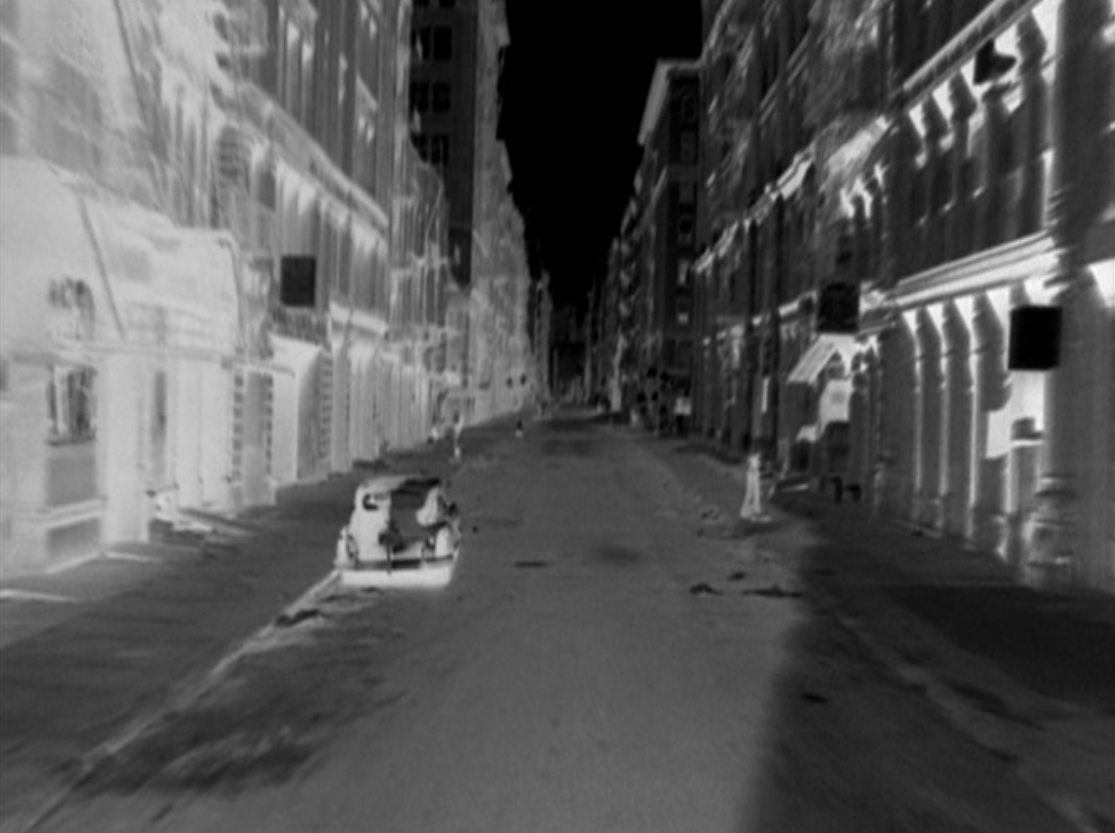
Go to TOC for this film ( (which has also a statement on purpose and manner of analysis and a disclaimer as to caveat emptor and my knowing anything authoritatively, which I do not, but I do try to not know earnestly, with some discretion, and considerable thought).
TOC and Supplemental Posts | Part 1 | Part 2 | Part 3 | Part 4 | Films Home
LINKS TO SECTIONS OF THE ANALYSIS ON THIS PAGE:
The Voyeur, The Dream, and Gloria's Rescue, Shots 132 through 175
The Situation Thus Far - On Kubrick's Treatment of the Rape of Gloria
Notes on The Voyeur, The Dream, and Gloria's Rescue. The voyeur. The journey through the negative dream world into Davey's role as Gloria's savior. Dopey. Editing. Davey's exploration of Gloria's room. The doll. The ship's wheel lamp.
The Story of Two Sisters, Shots 176 through 231
Notes on the Story of Two Sisters. Iris' story. Gloria's story. Shots 225 and 226. A problem of time. That plant.
A Proposal, Shots 232 through 236
Notes on A Proposal. The Kiss, and how Kubrick doesn't often depict romantic relationships.
132 Fade in to Gloria crossing a busy New York street. (16:50)
She clutches her purse to her chest in such a way that she doesn't appear just lost in thought but distracted and vulnerable. As she continues down a sidewalk, the manner in which men look at her communicates her vulnerability as a woman on the street.
133 MLS of Davey sitting in his apartment in the dark. (17:12)
Music begins as the light in Gloria's apartment cuts on, she returning home. Davey turns and watches her through the window in which he is reflected.
The music is yet another reframing of Gloria's theme, very close to how it was used at the Pleasure Land.
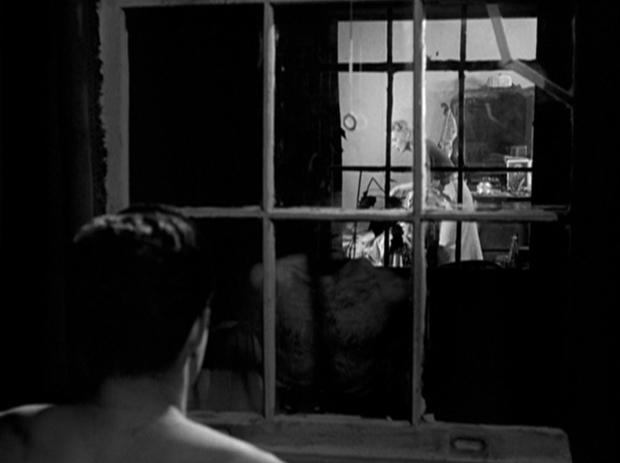
As she begins to undress, Davey's phone rings.
134 MCU of Davey from his right watching Gloria. (18:02)
135 MS of Davey going to answer the phone. (18:07)
We see the clock reads 12:20.
DAVEY: Hello?
TELEPHONE OPERATOR: Mr. Davey Gordon, please. Seattle's calling.
DAVEY (smiling): That's me.
TELEPHONE OPERATOR: Just a moment, your party's on the line.
GEORGE: Hi, Davey, this is Uncle George.
DAVEY: Hi, Uncle George.
GEORGE: How are you?
DAVEY: Fine. How are you?
GEORGE: We're all fine, too. Say, how would you like to take a vacation out here? Spend a little time with us? The country's mighty nice this time of the year.
DAVEY: It's really nice of you to ask me out. But...
GEORGE: Dave, we saw the fight on TV tonight.
DAVEY: So?
GEORGE: Nothing, we just saw it.
DAVEY: Must have looked great.
GEORGE: Well, these things happen, son...
DAVEY: I don't know what happened, George. I had him going.
GEORGE: Forget it, forget it. No, you need a vacation and we haven't seen you for two years. Why don't you make a reservation and come on out.
DAVEY: Well, look, uh, I don't know. Say, look, I feel a little dopey right now, George, but, uh, let me think about it. I'll call you.
GEORGE: You're not hurt are you, Dave?
DAVEY: No, no, I'm just tired, that's all.
GEORGE: Good. Then you let us know just as soon as you can.
DAVEY: Sure.
GEORGE: Oh, your Aunt Grace sends her love.
DAVEY: Oh, tell her the same from here.
GEORGE: Okay. Then as it stands now...
136 CU of Davey from his left. (19:19)
GEORGE: ...you let us know...
137 MS Davey. (19:20)
GEORGE: ...when to expect you.
DAVEY: I certainly will, Uncle George, and thanks for calling. It was nice hearing from you.
GEORGE: Take care of yourself.
DAVEY: And you, too. Goodnight.
GEORGE: Goodnight, Davey.
Hanging up, a dejected Davey watches the window as Gloria re-enters the field of vision, now dressed in her pajamas, goes to bed and cuts off the light, leaving him in the dark again. He then smiles, rubbing the phone, as if reconsidering George's offer.
138 Davey returns the phone to his bedside table. (19:53)
He sets his alarm clock, which reads 12:25, cutting on the lamp over his bed. He rests on the edge of the bed, then lies down and cuts off the lamp. Darkness overtakes the screen. The music ends and shifts to an ambient tonal landscape for the dream.
Shot 133 | Shot 134 |
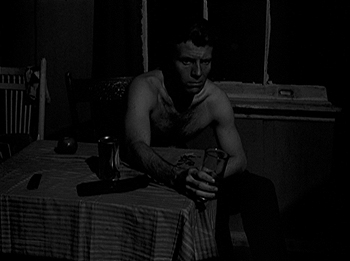 |  |
Shot 135 | Shot 136 |
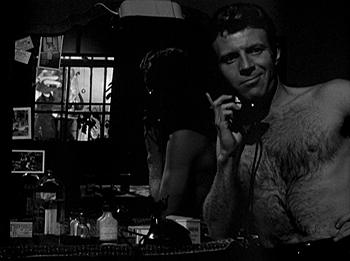 | 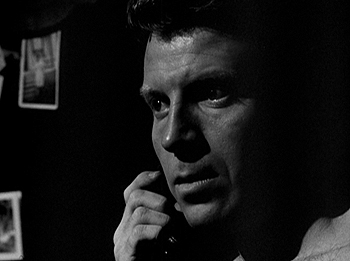 |
Shot 137 | Shot 138 |
 | 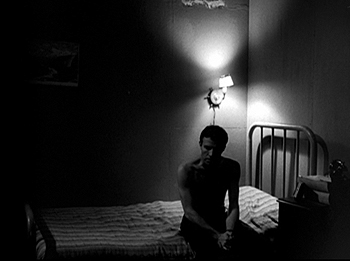 |
139 Negative view of street. (20:06)
140 Negative view of street. (20:28)
VOICE (voice-over): Go on home...you're a flop...
141 Negative view of street. (20:32)
VOICE (voice-over): Go on home!
A woman's scream enters.
142 Negative view of street. (20:35)
VOICE (voice-over): You're all through!
The woman's scream continues.
143 MCU of Davey waking to a scream. (20:37)
He sits up.
144 MS of Davey rushing to the window. (20:42)
He sees Vincent and Gloria grappling. Gloria drops to the floor. He raises the window and Vincent sees him.
DAVEY: Hey! What's going on in there?!
Vincent covers his face and tries to draw the blind then turns as if to flee. Davey runs to the door.
Shot 139 | Shot 140 |
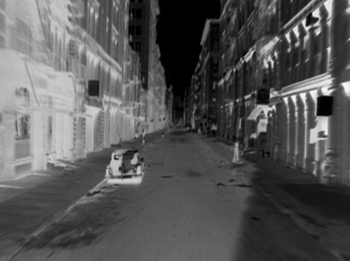 | 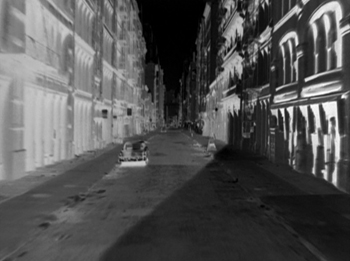 |
Shot 141 | Shot 142 |
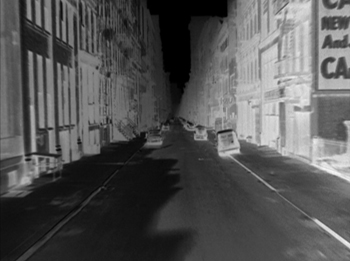 | 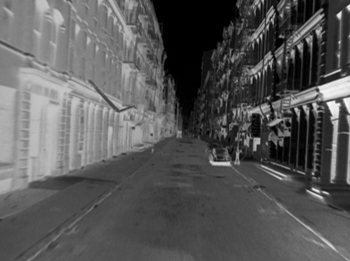 |
Shot 143 | Shot 144 |
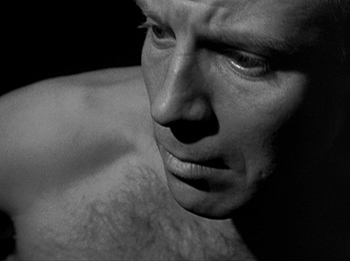 | 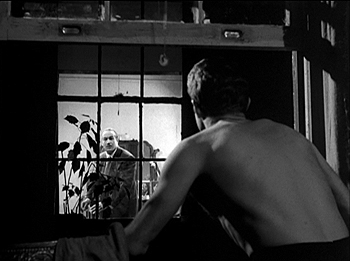 |
145 MLS Davey runs out his door and up the stairs, slipping on a shirt. (20:54)
146 MLS Davey coming toward the camera then continuing up another flight. (20:56)
147 LS Davey runs out the door onto the roof. (21:02)
148 MLS Vincent runs out of Gloria's apartment. The staccato piano of his musical theme begins. (21:06)
149 MLS Vincent going down the stairs. (21:08)
He hides to the side, hearing Davey enter from the roof and go into Gloria's apartment. Vincent's theme ends as he walks out of sight.
Shot 145 | Shot 146 |
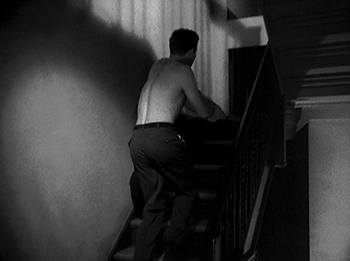 |  |
Shot 147 | Shot 148 |
 | 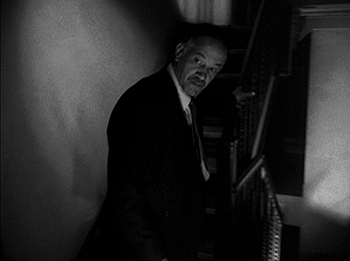 |
Shot 149 | Shot 149a |
 |  |
150 MLS Davey carries Gloria to her bed. (21:44)
DAVEY: There you go. That's better. (He sits next to her.) Look, if you don't mind me asking you, what happened?
151 MCU Gloria from over Davey's right shoulder. (21:59)
GLORIA: Well, about an hour ago...
Blur image as we transition to shot 152.
152 CU fade in on Gloria listening at her door to a knocking. (22:05)
She opens it and Vincent presses in.
153 MLS Vincent entering Gloria's room. (22:14)
He looks around, as if repelled by the poverty. Another musical theme begins, different from but closely aligned with Vincent's theme, lacking the piano stacatto.
GLORIA: Well? What do you want?
VINCENT (looks down, nervous, then approaches): I'm sorry. I really am sorry.
GLORIA (furious): It doesn't really matter now, does it?
VINCENT: I said I'm sorry. Can't you forgive me?
GLORIA: No.
154 MCU Gloria from over Vincent's right shoulder. (22:41)
VINCENT: Gloria, please.
GLORIA: Go away. Get out.
155 LS Gloria and Vincent standing at opposite sides of the table. (22:46)
VINCENT: That figures.
156 MCU Vincent, with Gloria beyond. His face is highlighted. (22:54)
VINCENT: All my life, I've always spoiled the things that meant the most to me, all my life.
GLORIA: I really don't care.
157 MCU Gloria. (23:01)
GLORIA: I just want you to get out of here.
158 MS Gloria and Vincent. (23:03)
VINCENT: Gloria, please, can't you understand. If only you could know how low and worthless I feel.
GLORIA: I didn't even know...
159 MS Gloria and Vincent. (23:09)
GLORIA: ...you had any feelings.
VINCENT (grasping her): Oh, you foolish girl. I'm, I'm mad about you. I want to get you out of here. I'll set you up right. I'll be your slave for the rest of my life.
GLORIA (pushing him away): Nothing, nothing, you couldn't do anything for me.
VINCENT (keeping hold of her as they cross in front of the window): Please. All right, don't forgive me, just tolerate me. Let me suffer...
160 MCU Gloria over Vincent's left shoulder. (23:23)
VINCENT: ...knowing how you feel.
GLORIA: Can't you get it, Vinnie? To me, you're just an old man. You smell bad.
161 MS Vincent grabbing Gloria. (23:29)
VINCENT: I'm mad about you. I can't stand when I see those guys dancing with you. Every time I see it my insides burn.
They circle, as Davey and Kid had circled.
GLORIA: Well, you won't have to see it any more.
VINCENT: Please. Please, just another chance.
GLORIA: No. No chance, no nothing.
VINCENT: Please.
GLORIA: Let go of me or I'll scream.
She screams. He puts his hand over her mouth.
162 MLS The room spins. (23:46)
163 MCU Gloria in her bed. (23:48)
DAVEY: Don't think about it any more. He won't come back. Don't worry.
GLORIA: I'm so tired now.
DAVEY: Just close your eyes. Don't worry about anything. I'll sit here with you for a while.
As Gloria shuts her eyes and falls to sleep, her musical theme begins.
Shot 150 | Shot 151 |
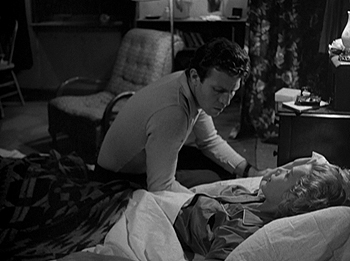 | 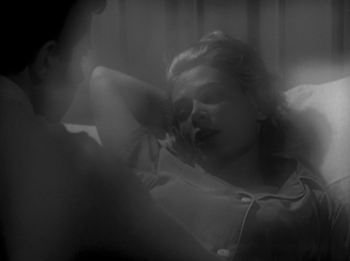 |
Shot 152 | Shot 152a |
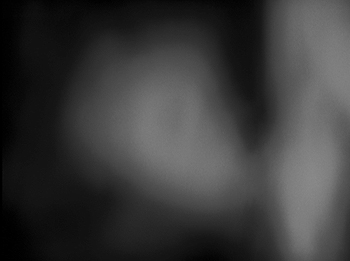 | 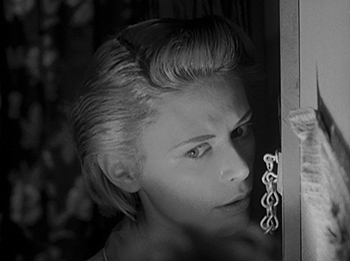 |
Shot 153 | Shot 154 |
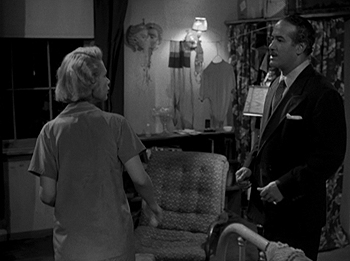 |  |
Shot 155 | Shot 156 |
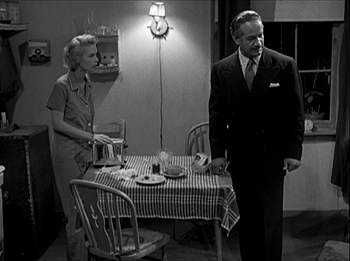 | 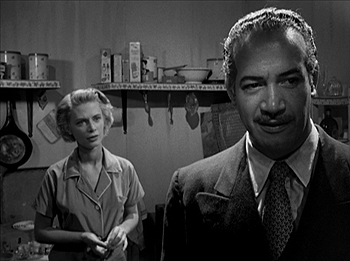 |
Shot 157 | Shot 158 |
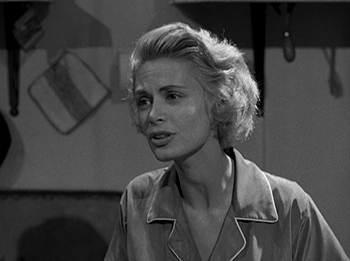 | 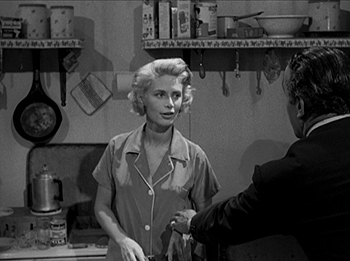 |
Shot 159 | Shot 160 |
 | 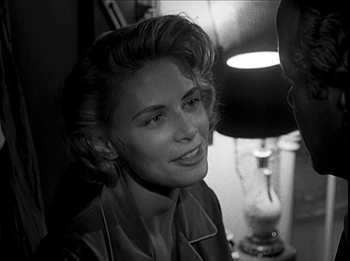 |
Shot 161 | Shot 162 |
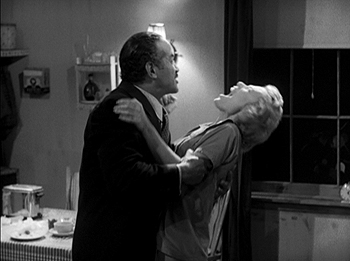 | 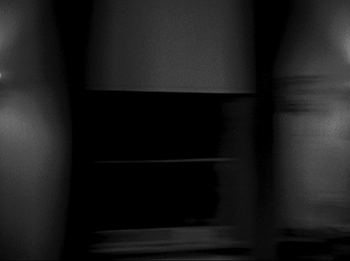 |
Shot 163 | Shot 163a |
 | 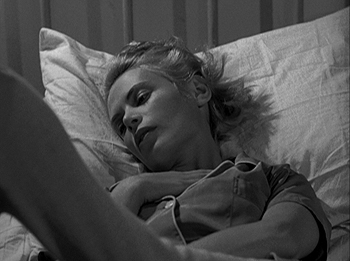 |
164 MLS Davey rising from Gloria's bed. (24:24)
165 MCU Davey cuts off her bedside lamp. He moves to leave then sees her doll. (24:31)
166 CU the doll. (24:36)
167 MCU Davey looking at the doll. (24:41)
168 MLS Davey looks about the room. (24:44)
Kubrick has highlighted Gloria and the doll.
169 MLS of Gloria from above her bed. (24:50)
170 MLS Davey tours her room. (24:56)
One can joke about his being drawn to the stockings on the line, but as opposed to Vincent's looking about the room with contempt, Kubrick makes a point of Davey's taking it in with an interest as to the woman and a sympathetic eye.
171 MCU of Davey touching the stockings. (25:21)
172 MS of Davey. (25:26)
173 LS of Davey. (25:31)
He goes to her dresser. Smells a bottle of perfume. Looks at a postcard. Checks out a music/powder box. Looks at a double picture frame holding images of a man and woman.
174 MLS of Gloria asleep. (26:38)
175 CU again of the doll. (26:40)
Fade out on the curious doll.
Shot 164 | Shot 165 |
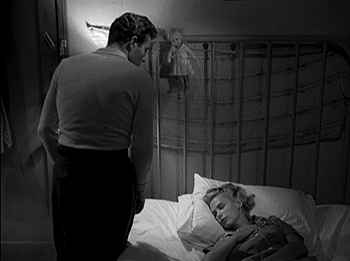 | 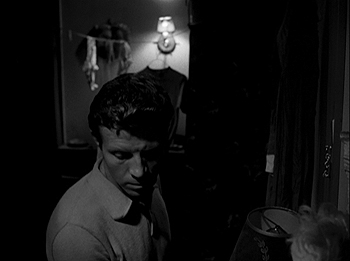 |
Shot 166 | Shot 167 |
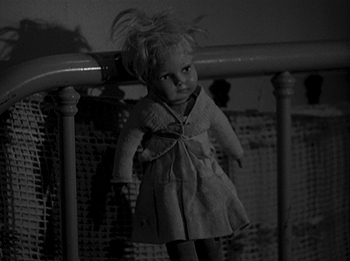 | 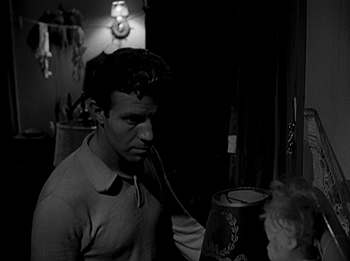 |
Shot 168 | Shot 169 |
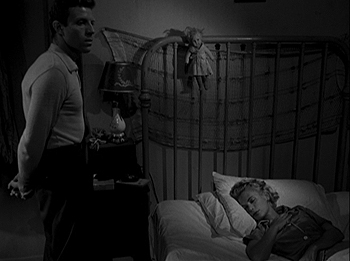 | 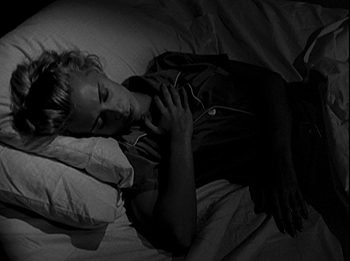 |
Shot 170 | Shot 171 |
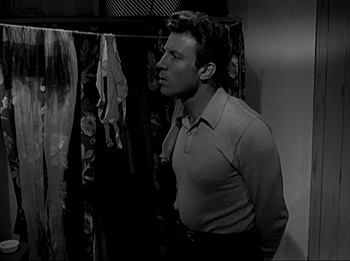 | 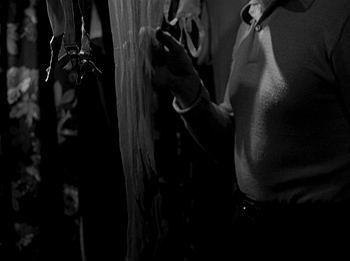 |
Shot 172 | Shot 173 |
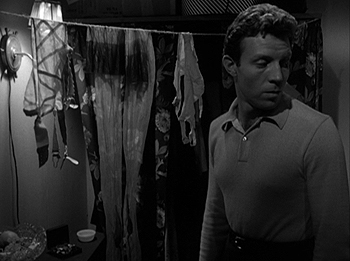 | 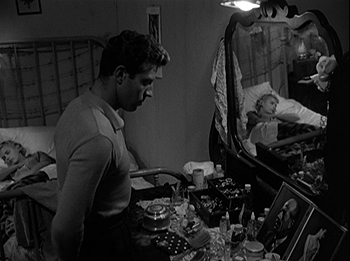 |
Shot 174 | Shot 175 |
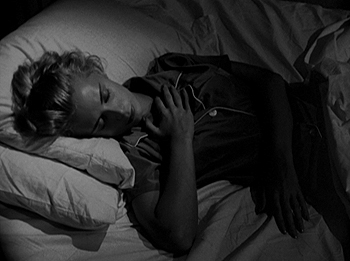 |  |
Looking at the story thus far, Walter lost his fight, he was beaten in the ring. And Gloria, his counterpart? Though her response to Vincent in his office appeared to be one of involvement, afterward we see her making her way home, distracted, and Kubrick makes it clear when Vincent visits her that she has been raped. Vincent has shown up at her home to apologize, but Gloria angrily tells him it's too late for that. Kubrick doesn't show Gloria clearly fighting off Vincent in his office, it seems that she willingly submits to a kiss, which makes the situation more complex for many viewers of the time. A kiss is not consent for sex, just as Gloria's profession is not a consent for sex. Gloria clearly did not want to have sex with Vincent; she has been raped. And though Vincent professes to be sorry, what he really wants is her full submission. She demands he leave. He struggles with her, unwilling to leave. She screams. Davey hears and runs to the rescue. This is Gloria's story, at least, that she was raped, and I don't think that Kubrick is setting up a situation in which we might wonder about the facts, if she's telling Davey the truth. Though there are gaps in Gloria's story, this isn't Rashomon. No, we saw Gloria walking home, abject. Something was wrong and she was fearful when realizing it was Vincent at her door. He even acknowledges, for the benefit of the audience, that he raped her. Though it's never explicitly stated what he has done, the only conclusion that can be sensibly had is rape.
The audience may be thrown by Gloria's response to her boss and rapist, her cutting remarks about his age and smell, delivered with a smile, but then this is a woman who has been raped, in a time when women were judged for being raped, who is now being stalked, whose rapist won't leave her alone, and I don't really think the correct response of the audience is to think, "Oh, well, that's not nice of her to say that to Vincent. Maybe, since she's not a nice, polite girl with him, she is at fault for her own rape". The audience will likely be expecting something different from Gloria, they want her to behave differently with him, to maybe bravely demand justice, or only be terrified, but not be impolite, so she is a little confusing to them, and I think this is intentionally so. Kubrick will keep the audience guessing about Gloria up to the film's end. Even though she is a woman who was raped and then is is kidnaped by her rapist, there are times when her actions can be read in divergent ways by the audience. How Kubrick deals with Gloria is how he deals with many of the female protagonists in his films, setting the woman in a situation where the audience's interpretation of her is of an especial significance they likely don't realize. It seems, often enough, that Kubrick is teasing out underlying sexism and misogyny in the viewer.
In Fear and Desire a woman is taken prisoner by enemy military. She is left in care of one of them, and while she is tied to a tree, one of the soldiers attempts to coerce her into making love to him. He is pleading, insistent to the point where there seems a danger of rape. She appears to acquiesce, but then attempts to escape when he loosens her bonds, and he shoots her. But the audience had been initially primed to like the soldier who has become unstable, and in an attempt to salvage that empathy will the audience instead view the girl as leading him on in what becomes her attempt to escape, will they see her as deceptive and treacherous? Will they think she has ruined the possibility of what could have been a love story?
Though the audience is given no reason to like Vincent, much the same happens here due Gloria's being a dance hall girl, and how the audience interprets the situation relates strongly with how an audience will interpret Lolita and the role of Wendy in The Shining. Gloria has been raped and will be kidnaped. But she is a woman who dances for hire, who gives companionship for hire, which is a mark against her in the eyes of some in the audience. She went with Vincent up to his office (taking her away from the soldier with whom she was dancing, his tactic was already aggressive, fighting him). She watched a boxing match in the dark with him, alone with him in his office, and then kissed him. That's another couple of marks against her. She kissed the gangster! Then, when he comes to her apartment to "apologize" for having raped her, she's tells him it's too late, tells him to get out, and when he doesn't get out she is "mean", telling him he's an old man and that he smells like an old man. There are members of the audience who are going to view her as not acting as they think an innocent, raped woman ought to act. They will see her as not nice. In a later scene, when she is kidnaped and leads Vincent on, at gunpoint, many members of the audience will be thinking, "Oh, look at how cunning and sly she is. She's a bad female. She probably deserves what she gets." That's just the way one is not supposed to feel. It's not that anyone is going to be thinking that Vincent is a good guy, but there will be a number of people who will ignore the facts of Gloria's rape and kidnaping and decide she's bad because she behaves in a way they don't think a raped or kidnaped woman should behave.
To me, the full denouement to Kubrick's methodology in respect of how women are presented in his films is had in Full Metal Jacket. The enemy is a fact of war and an American audience is on the side of the American platoon because they are American, they are the protagonists, we know who they are, have been shown who they are, and we take their side because the story has set us up to take their side. About the only Vietnamese we've encountered are two prostitutes. When the platoon is cut down left and right by a sniper, killing off characters with whom we've empathized, we hate the enemy who is doing this. They are simply the enemy. But then the enemy is revealed as being a young adolescent female, and they become more than just the enemy. They are female. The response of the soldiers is intended to mirror that of some of the members of the audience. Surprise. And not only confusion. Some feel rage. Why? The enemy is no longer just the enemy but has the audacity to be a young female. The rage some of the soldiers feel is amplified by the sniper being a woman, revealing the full toxicity of that misogyny. In my estimation, Kubrick time after time sets up situations for revelation of an audience's implicit misogyny toward female characters.
There are some beautiful shots in this scene. Shot 136, inserted while Davey is conducting his smiling phone call with Uncle George, is as if to see an alternate face of Davey, one of absolute panic now that he's lost himself in his role as a fighter. One could compare this to the scene in The Shining in which Danny has gone to get his fire truck from his room and Jack calls the boy to sit next to him. Jack's expression is distant, unnerving in its blankness, but his reflection in the mirror gives a slightly different aspect so that he appears to be smiling.
In his films, Kubrick plays with the audience's role in relationship to the film, as if they are an integral part of the performance. He also plays with the role of the camera and the director and writer relative to what they've created. This is most overtly done in A Clockwork Orange and in a variety of ways. For example, the audience finds itself eventually in the role of Alex in his theater audience seat watching the behavior modification films, but then the audience is also the screen upon which the behavior modification films are played.
In the fight scene, Davey and Kid were the ones on stage, Vincent and Gloria watching Davey's defeat. And the theater audience as well, they taking the place of the non-present audience in the sports arena.
Now, the lights off in Davey's apartment, he turns and watches Gloria on her stage, in her apartment. The voyeurism just escapes being very, very, very creepy because Gloria has left her drapes open, and in the earlier scene where they were preparing for work we sensed both their casualness due urban desensitization (I've been in some high rise neighborhoods that are like that, where people leave open their blinds, as if living on a higher floor acts as a curtain). But at the beginning of this scene in which Gloria prepares to get ready for bed, there's enough of a charge that we feel decidedly wrong as Davey watches Gloria in shot 133. We feel the danger of it in a way we did not begin to feel in shot 63 when Kubrick had us watching Gloria taking off her shirt at Pleasure Land as she changed into her dancing attire, revealing her in her bra. Kubrick repeats that here, only Gloria takes off her top to reveal a black slip instead, with us accompanying Davey in his voyeurism. When we didn't have the window separating us and Gloria, instead seeing her reflected in her mirror in the Pleasure Land dressing room, that mirror and the camera's relationship to it served to distance and the effect of voyeurism was not had. But now we've the window separating us from Gloria, and Kubrick is replaying Gloria's undressing, comparing and contrasting the effect of our watching Gloria undress through the window, in the dark, as opposed to the camera not spying on her, being in the room with her, and also opposed as well to earlier when Davey's light was also on and she could see through his window as well and was aware he was there. When the phone rings and interrupts Davey's solitude, as he watches Gloria, we are grateful. The danger is halted, and Gloria steps out of view.
That this voyeuristic scene follows Gloria having been raped, though we don't know yet she has been raped, needs also to be considered. She was violated by Vincent and there is then the threat of a voyeuristic violation (or opportunism) by Davey, and by extension of Davey the audience is in danger of becoming voyeuristic as well even though all this is acted and not real.
It's interesting that Kubrick is willing to make the audience have this very queazy moment of discomfort with Davey, the film's hero. That he is partly saved by a distracting phone call may remind of Eyes Wide Shut and how the phone call from Alice interrupts Bill when he is with Domino and rescues him from having sex with the prostitute and betraying their marriage vows. Bill is jerked out of a precarious situation and reunited with the who that he usually is.
Before Davey lies down to sleep one gets the feeling that he has already begun to readjust and will perhaps travel out to Seattle to begin another stage of his life. Then he has the "negative" dream in which is replayed the voice we heard in shot 130 heckling him from ringside and urging him to go home. But the dream is also a transitional state that interrupts this humiliation when he wakes to Gloria's scream and his new role as Gloria's defender.
I will go more into this dream and how it functions in the film later, also, the likely influence of Cocteau's Orpheus.
A number of people question the appearance of the cartoon figure of Dopey on Danny's bedroom door in The Shining and its disappearance after his vision. I won't get into the vanishing aspect here but I thought it might merit mentioning how in this section Davey, who is reluctant to take that vacation out to Washington state (but seems perhaps resolved after the conversation) describes himself as dopey. No, I don't think he is saying he is like the cartoon figure. He's just been through a fight and he's dopey in as much as he's going to be at least a little punch drunk. What's interesting is that Dopey's appearance in The Shining is paired with the prospect of going somewhere Danny may not want to go, and his consequent vision, just as we have Davey then lying down to sleep and having his nightmare in which positive and negative invert, a dream which seems also to have premonitory significance. Dopey's appearance in The Shining may have been, at least in part, referring back to Killer's Kiss, comparing Danny's prophetic vision with Davey's dream that also turns out to be prophetic.
Dopey is associated with the fool and Davey plays the part of the good-natured fool for a good bit of the film before he fully comprehends he's in a fight that is a serious matter of life and death.
There is some very sketchy editing going on in the Vincent and Gloria section. The flow is bizarre, and I wonder if Kubrick was attempting to bring some of the nature of the fight scene into the encounter and it just didn't work.
Again, we're put in the role of intruding upon Gloria's privacy through Davey's exploration of her room while she sleeps. Earlier, Kubrick showed the audience around Davey's apartment with close-ups of his photos on the mirror and taking us then on a 270 degree tour of the room. Kubrick had not done the same with Gloria's apartment, instead saving our having a closer acquaintance with it through Davey in this scene. Just as Davey watching her through the window put us in the role of voyeurs (though Davey and Gloria obviously are well aware of each the other's view into their personal lives, and at least in the opening section of the film seem to accept the unavoidable happen-stance of this through leaving the shades up), we are placed in a voyeuristic role as he wanders about examining her hosiery then the articles on her dresser. We had observed the articles on her dressing table at Pleasure Land and there had been no voyeuristic discomfort. The reason we know that voyeuristic conflict is intended for the audience here is due Kubrick's reserving any exploration of her room until it is through Davey's actions after Gloria has fallen asleep.
However one interprets the scene is going to be highly personal. Kubrick largely keeps Davey's arms in a place of restraint behind his back, which not only conveys a certain respect on his part (though he moves beyond this several times) but also plays out the audience's visual taking in of the scene, their restraint as the audience in their seats. Thus, when Davey breaks that restraint and handles Gloria's hose, the audience is more likely to feel their texture, and when Davey unstops her bottle of perfume to smell it the audience is more likely to have a whiff of its scent.
Kubrick had us examine Davy's photos earlier and read his mail without a third party intervention. Now, Kubrick has our examining Gloria's photos and her mail through Davey.
But, though Gloria sleeps, there is another presence watching Davey and us, Gloria's doll which hangs above her bed.
Creepy doll. There is no way that doll isn't creepy and telling us something about Gloria.
Davey's and Gloria's rooms are distinctly different save one unifying factor. A ship's wheel lamp hangs in both. A ship's wheel lamp also makes an appearance in The Killing. This must have been a very popular light fixture for the time, but I'm not confident it's not without some meaning in its suggestion of the ship.
176 MLS Davey and Gloria having breakfast at her table. (26:45)
Fade in. Gloria's theme music plays, very light and jazzy.
DAVEY (voice-over): I locked her door and went home, but first thing in the morning I went back across to see how she was. My knocking woke her up but she was all smiles and yawns and invited me in for breakfast. Later, over coffee, she told me she had seen the fight and I suppose that got me started talking about myself, about what a wash-up I was and how I was going back to Seattle to work on my uncle's horse ranch. But when I think back about it now, I realize that all the time I was talking, the thing that was really in my mind was...
177 MCU Gloria from her left. (27:15)
DAVEY (voice-over): ...to remember not to ask what it was her boss, Rapallo, was so sorry for.
The music ends.
178 MS Davey and Gloria at the table. (27:19)
DAVEY: Anyway, let's talk about you. Like, who are those people in that picture over there?
179 CU Gloria's dresser top showing the portrait of the man and woman. (27:27)
DAVEY (off screen): And how'd you ever get messed up with that dance hall guy? What's the matter?
180 MS Davey and Gloria at the table. (27:33)
GLORIA: Nothing. It's just that...so funny that you should ask those questions that way, together that way.
DAVEY: Why?
GLORIA: Well, they have both so much to do with each other.
DAVEY: How do you mean?
181 MCU Gloria. (27:48)
GLORIA: Sort of an involved story. Do you really want to hear it?
182 MCU Davey. (27:51)
DAVEY: If you don't mind telling me, I would, very much.
GLORIA: I don't mind.
183 MCU Gloria. (27:55)
GLORIA: I don't mind. For some reason I feel like telling you. I've never told anybody before.
184 MS 3/4 view of Davey and Gloria at the table. (28:00)
185 CU of the photos. (28:04)
GLORIA: This is my father, and this is my sister, Iris.
Blur transition to shot 186. Iris' theme music begins.
186 LS Ballet dancer on stage. (28:11)
GLORIA: But I suppose it's really Iris' story. She was a ballet dancer, and everyone said she was very good. She adored daddy, and of course she was his favorite.
Shot 176 | Shot 177 |
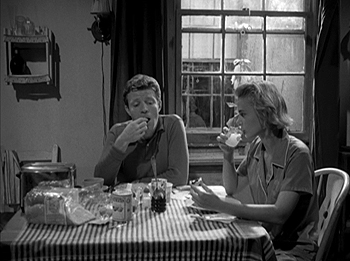 | 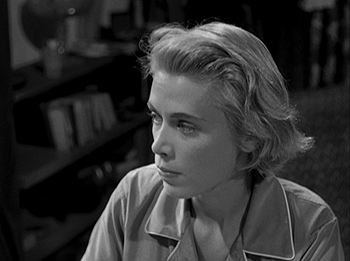 |
Shot 178 | Shot 179 |
 | 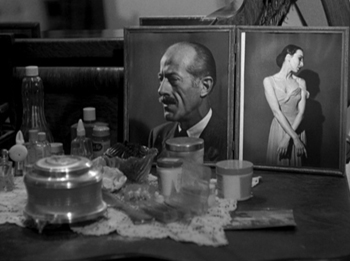 |
Shot 180 | Shot 181 |
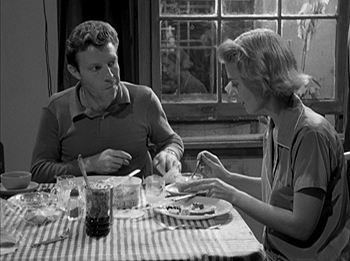 | 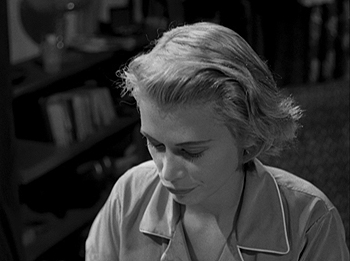 |
Shot 182 | Shot 183 |
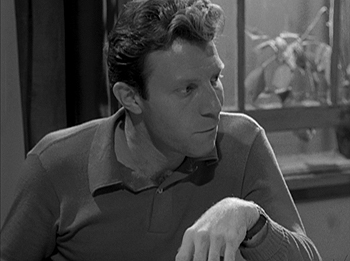 |  |
Shot 184 | Shot 185 |
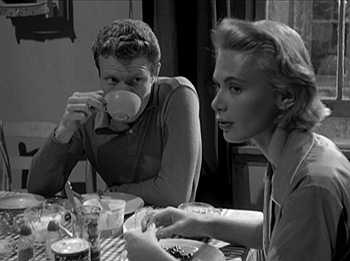 | 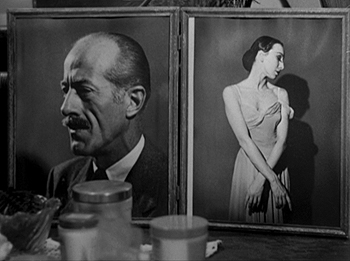 |
Shot 185a | Shot 186 |
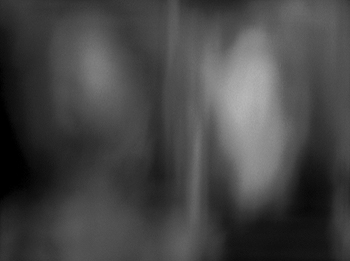 | 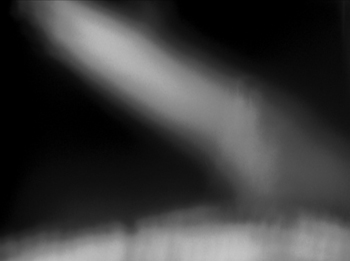 |
187 LS Ballet dancer from front. (28:21)
GLORIA: But let me start from the beginning. Iris was 8 years old. Father was a writer with a growing reputation...
188 MLS Ballet dancer. (28:29)
GLORIA: ...and mother was very beautiful and very intelligent. They loved each other...
189 LS Ballet dancer from above stage left. (28:36)
GLORIA: ...very much and they were very happy. Then I was born and my...
190 MCU Ballet dancer's legs. (28:39)
GLORIA: ...mother died the same day. They say father...
191 LS Ballet dancer. (28:42)
GLORIA: ...went on a two week drunk to celebrate the double event. And after that I don't think he ever thought of another woman. Time passed and Iris grew more beautiful each day.
192 MCU Ballet dancer's legs. 28:53
GLORIA: She was the image...
193 LS Ballet dancer. (28:55)
GLORIA: ...of her mother. Everyone said so. Iris was daddy's favorite and I was very...
194 MCU Ballet dancer's legs from the rear. (29:01)
GLORIA: ...jealous.
195 LS Ballet dancer. (29:02)
GLORIA: And maybe I began to hate her.
196 MS Ballet dancer. (29:06)
GLORIA: Daddy was good to me. And maybe...
197 LS Ballet from left wing. (29:08)
GLORIA: ...he loved me a little, too. By the time she was 20, she was dancing with the Ballet Russe, and daddy was so proud of her. And then...
198 MS Ballet dancer from the rear. (29:16)
GLORIA: ...I remember the day clearly. It was my 13th birthday.
199 LS Ballet dancer from rear left wing. (29:21)
GLORIA: ...Sunday afternoon. Iris came home excited and told us of her marriage proposal. The man wasn't bad looking. In his early thirties. And very rich. Father knew...
200 LS Ballet dancer from high left wing. (29:32)
GLORIA: ...him and liked him. But he couldn't stop laughing when Iris told how she said...
201 MS Ballet dancer from behind with stage light shining on her. (29:36)
GLORIA: ...no simply because the fellow wanted her to give up her dancing and just be his wife. She never said if she loved him or not. Then, a few months later, daddy took sick and didn't get better. And it turned out he never would and that he would...
202 LS Ballet dancer front. (29:54)
GLORIA: ...need constant medical care until he...
203 MS Ballet dancer front. (29:56)
GLORIA: ...died. Six months to two years...
204 LS Ballet dancer from screen left. (29:59)
GLORIA: ...they said. Iris' salary wasn't enough and in two months time all our savings were gone.
205 LS Ballet dancer from stage rear. (30:08)
GLORIA: I couldn't work. I was only 13 and still in grade school. The next thing I knew she married her rich suitor and we were all living in great...
206 LS Ballet dancer from front left. (30:08)
GLORIA: ...style on his state in Long Island. Daddy had the best care money could buy and he seemed...
207 MLS Ballet dancer from rear. (30:25)
GLORIA: ...happy despite everything. Iris gave up her dancing, according to the marriage bargain...
208 MS Ballet dancer from front. (30:31)
GLORIA: ...and did little else...
209 LS from the left rear. (30:33)
GLORIA: ...but sit at daddy's bedside.
210 LS Dancer from left front. (30:35)
GLORIA: Sick as he was he always laughed alot when they were together. I guess I hated her more than ever, now. A year passed like that. Her husband was a sweet man.
211 MCU Dancer twirling. (30:50)
GLORIA: But none of us paid...
212 MS Dancer's legs from front. (30:52)
GLORIA: ... much attention to him.
213 MCU Dancer twirling. (30:53)
214 LS Ballet dancer from left rear. (30:53)
GLORIA: By then I'm sure he knew she didn't love him, but he never said anything. Then one cold winter morning the maid woke us and said that daddy was dead.
215 MLS Dancer from front. (31:05)
GLORIA: Iris was like a stone.
216 LS Ballet dancer from left rear. (31:07)
GLORIA: She didn't even blink. I began to cry and shout...
217 LS Dancer from rear. (31:12)
GLORIA: ...that I hated her. That she had only pretended with Daddy. And that...
218 LS Ballet dancer from left front. (31:16)
GLORIA: ...she didn't ever love him. She didn't say a word. In his room, she stood quietly over his body for...
219 LS Ballet dancer from rear. (31:23)
GLORIA: ...a long time, and smiled.
220 LS Ballet Dancer from left front. (31:26)
GLORIA: Then she went upstairs to her room and put on their favorite record. It was from one of her...
221 LS Ballet Dancer from left rear. (31:31)
GLORIA: ...ballets. She played it very loud. A short time later her husband found her in bed with the covers drawn up to her neck. She had cut her wrists, and she was dead.
222 MS Ballet dancer from front. (31:43)
223 MS Ballet dancer from rear. (31:44)
GLORIA: She left me a note...
Begin Gloria's theme music.
Begin blur transition to shot 224.
Shot 186a | Shot 187 |
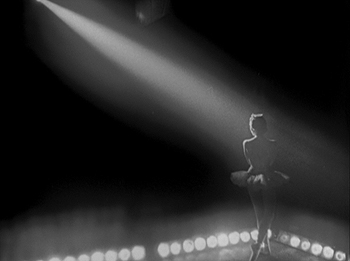 | 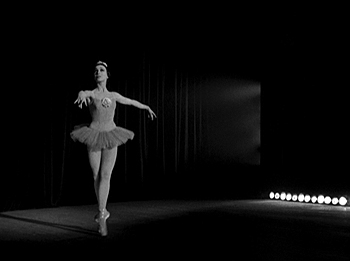 |
Shot 188 | Shot 189 |
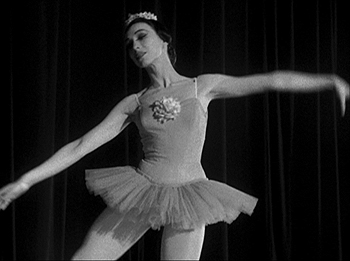 | 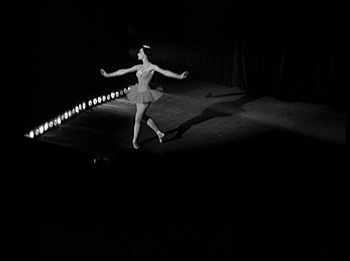 |
Shot 190 | Shot 191 |
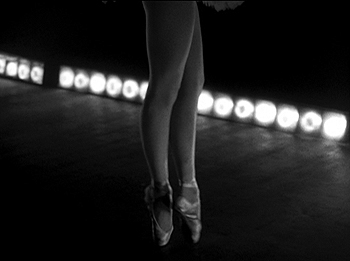 | 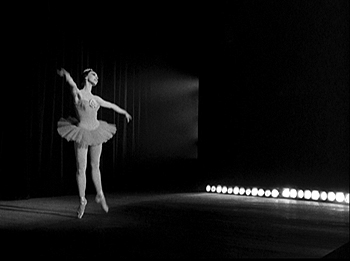 |
Shot 192 | Shot 193 |
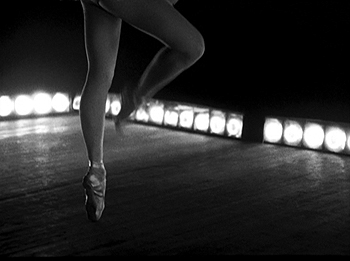 | 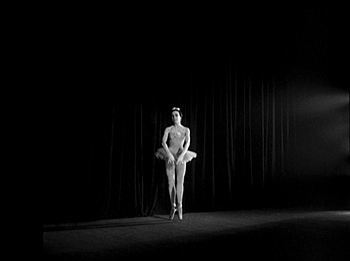 |
Shot 194 | Shot 195 |
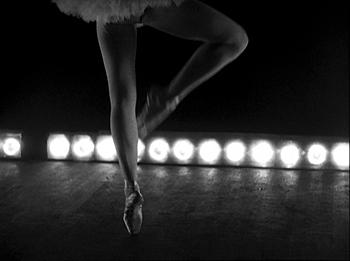 | 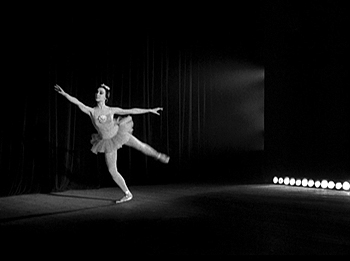 |
Shot 196 | Shot 197 |
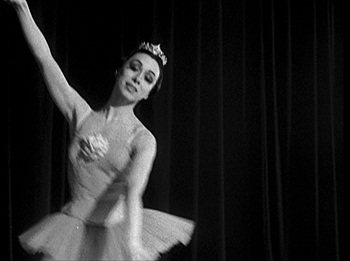 | 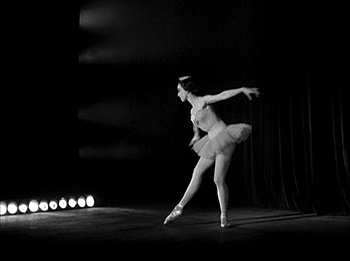 |
Shot 198 | Shot 199 |
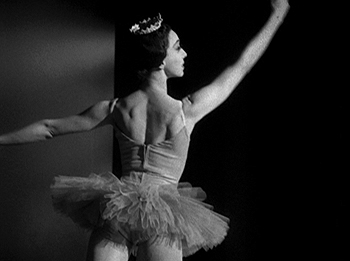 | 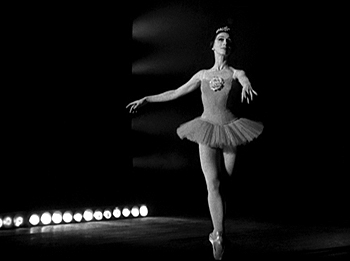 |
Shot 200 | Shot 201 |
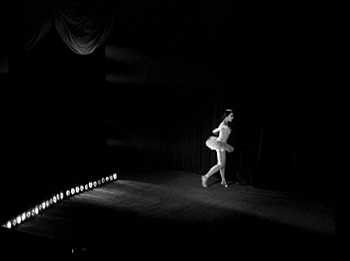 | 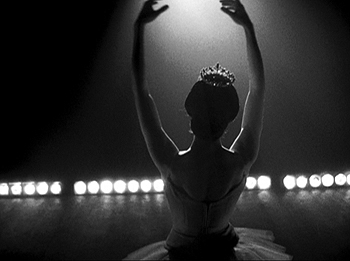 |
Shot 202 | Shot 203 |
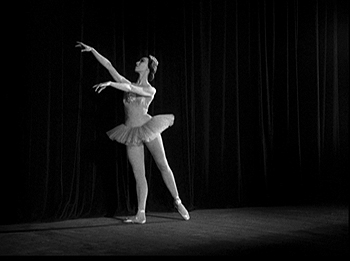 |  |
Shot 204 | Shot 205 |
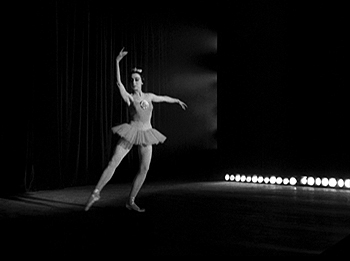 | 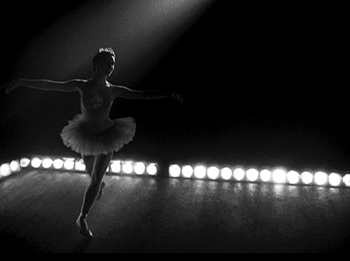 |
Shot 206 | Shot 207 |
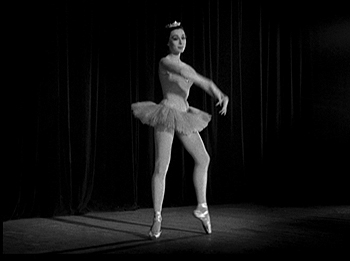 | 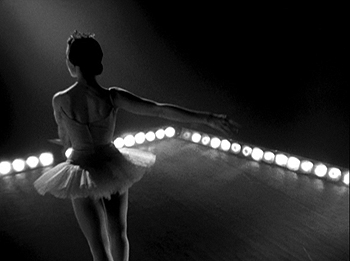 |
Shot 208 | Shot 209 |
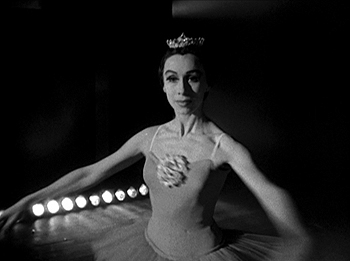 | 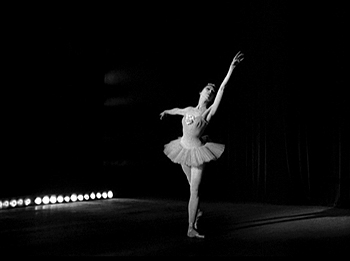 |
Shot 210 | Shot 211 |
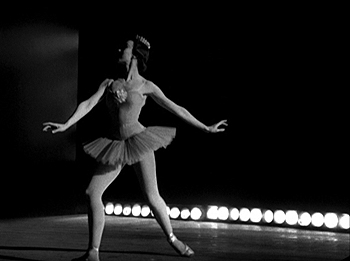 | 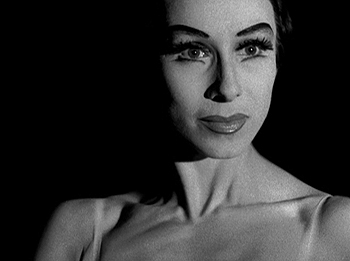 |
Shot 212 | Shot 213 |
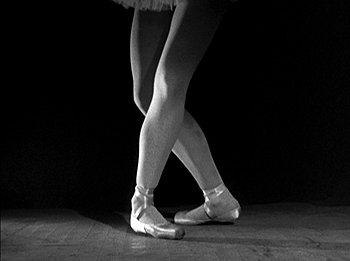 | 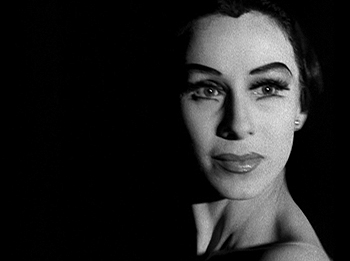 |
Shot 214 | Shot 215 |
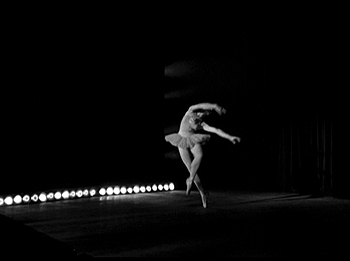 | 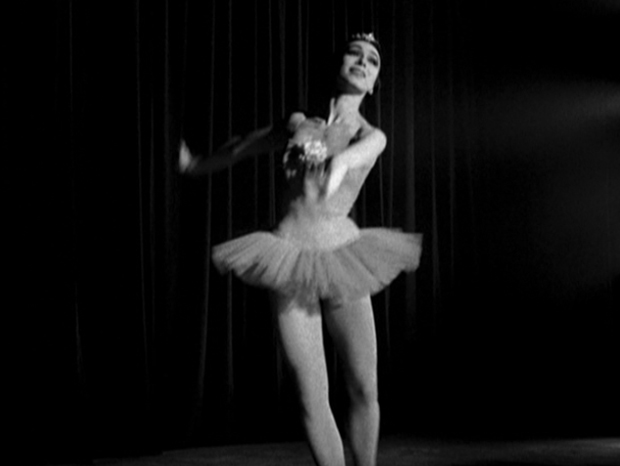 |
Shot 216 | Shot 217 |
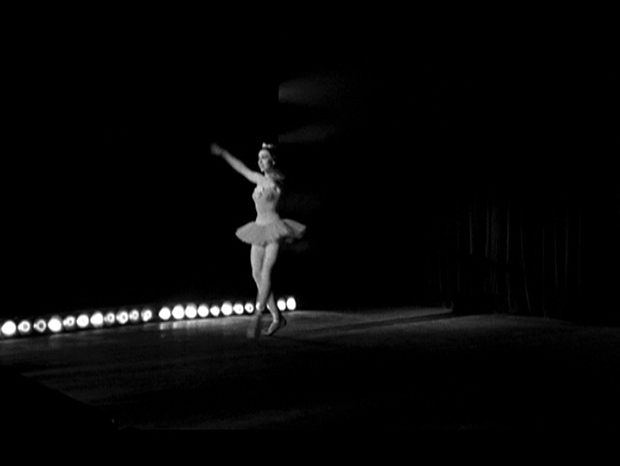 | 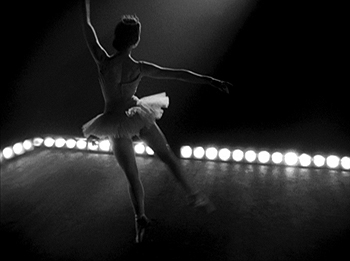 |
Shot 218 | Shot 219 |
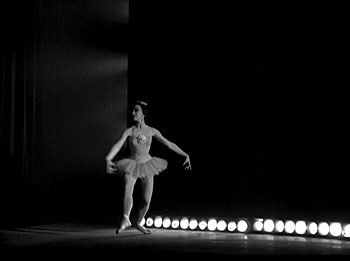 | 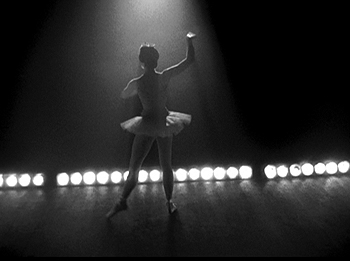 |
Shot 220 | Shot 221 |
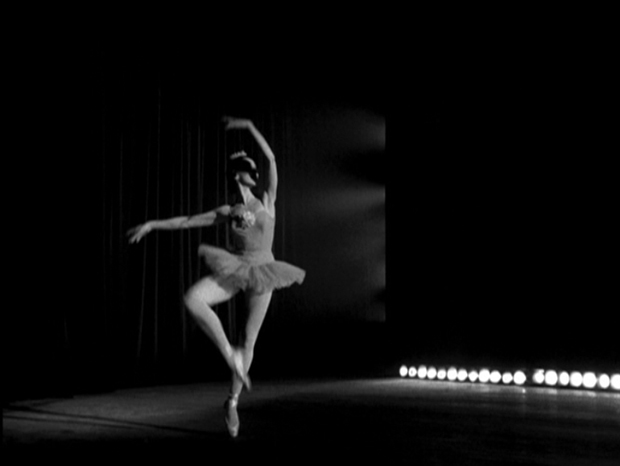 | 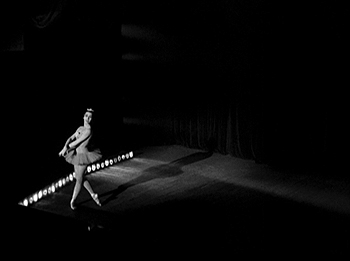 |
Shot 222 | Shot 223 |
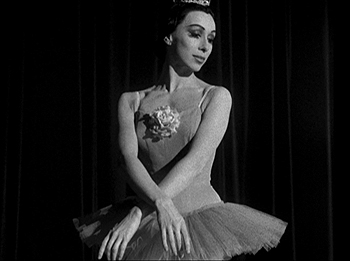 | 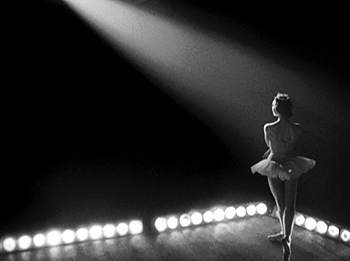 |
Shot 223a |
|
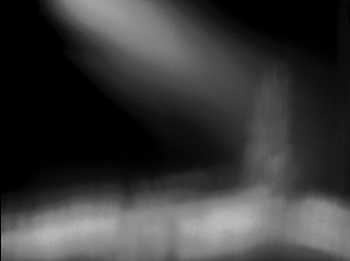 | |
224 MCU Gloria. (31:48)
GLORIA: ...said she loved me.
225 MS Davey from behind Gloria. (31:51)
GLORIA: She was sorry for making a mess of everything between us.
226 MS Davey. (31:55)
There's a peculiar cut here where Gloria vanishes from the screen. At first I counted it as a legitimate if odd cut to another shot. Then I considered it could have been done when the film was prepared for rerelease, some damaged frames removed. I've not counted these as two shots but one, though we've the odd effect of Gloria vanishing right off the screen in the middle of the shot rather than continuing her walk off screen right. My rationale will be explained in the final section in relationship to shots 490 through 494. I think there's also a relationship to shot 451.
GLORIA: A few days later I was in the city attending to some legal things and I happened to pass the dance hall. The sign read Pleasure Land, dancing partners wanted.
227 MCU Gloria standing before the window. (32:06)
GLORIA: I don't know what possessed me. I went up. I actually took the job. I don't understand any part of it. Every night, I worked at that depraved place.
228 MLS Davey at the table. (32:18)
GLORIA: A human zoo. I kept thinking, at least Iris never had...to dance like this.
229 MCU Gloria standing before the window. (32:06)
GLORIA: And then I started to feel less unhappy.
230 MCU Davey. (32:31)
231 MCU Gloria standing before the window, from the left rear. (32:33)
DAVEY (off screen): Come on, let's go out for a walk.
Begin blur transition to shot 231. There is no music through the shot of Penn station, instead the ringing of the bell and the chugging of the train.
Shot 224 | Shot 224a |
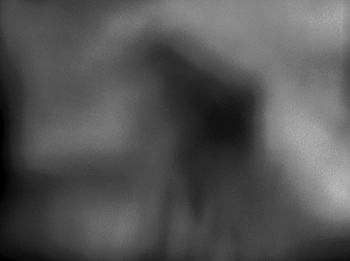 | 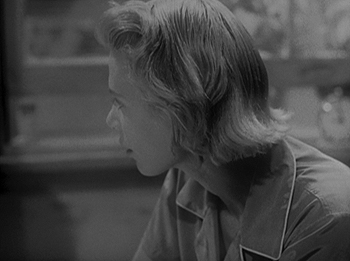 |
Shot 225 | Shot 225 |
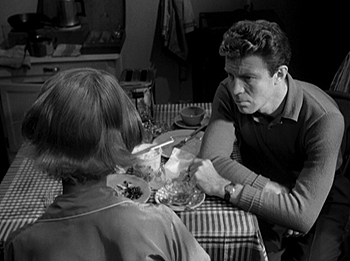 | 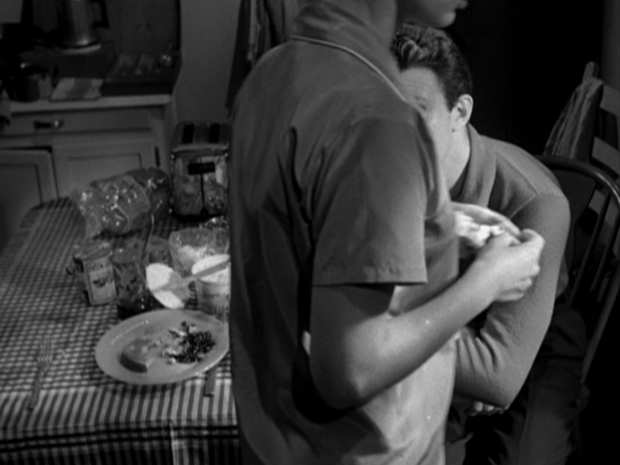 |
Shot 226 | Shot 227 |
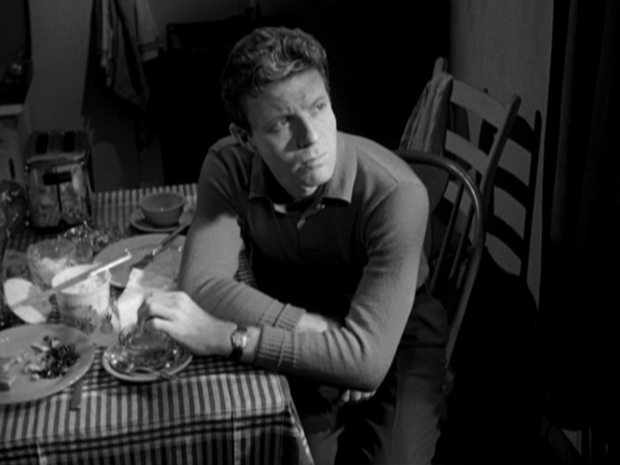 | 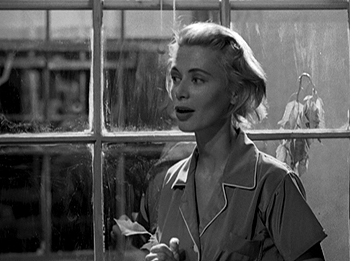 |
Shot 228 | Shot 229 |
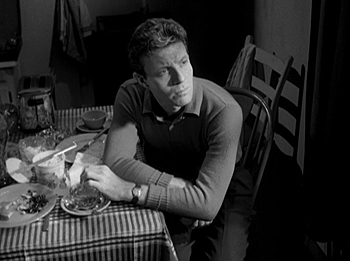 | 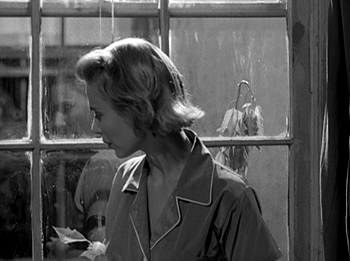 |
Shot 230 | Shot 231 |
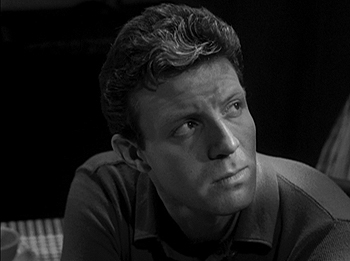 | 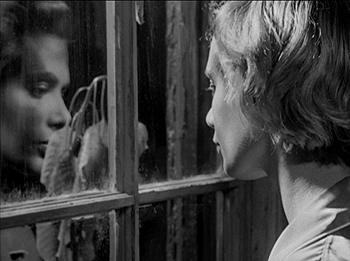 |
Shot 231a | |
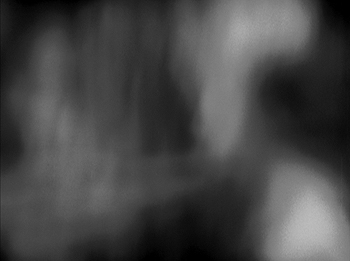 | |
I don't know why but getting all the shots from the ballet sequence was difficult. I had to review numerous times before finally getting it right.
Iris' story is about personal dreams and desires, free will being thwarted by fate. The muscular power of her body, during her dance, is to be compared with Davey's as the boxer. Whereas Davey vies against other boxers and ultimately himself and his glass jaw, Iris' battle with fate, which removes her from the theatrical lights, just as Davey must step out of the ring, is first in the form of the marriage proposal then her father's illness. Her father's laughter at her refusal to marry for sake of her dancing is that of undeniable fate that wins when her father becomes ill and she marries in order to support her family.
After the death of her father and the suicide of her sister, a dream-walking Gloria ends up taking the job at the dance hall without any sense of direction, it simply happens. She functions somewhat as an automaton, stepping into the dancing role of her sister, but in a degraded aspect, as if paying penance. Gloria's rationalization is that at least her sister never had to dance as she does, in a dance hall. But Iris was instead in the position of living in a purely contractual marriage (one could look at it as a form of prostitution) in order for her family to have a home.
Iris' story is an expression of the compromises many individuals have to make in their lives, and it's an extreme price. She gives up her love for dance. She gives up her body to a husband she seems not to love, who has the patriarchal supremacy to demand that she commit herself only to the marriage and give up ballet. The audience could question why she doesn't return to dance, when the father dies, and divorce her husband. What is the director wanting to convey about her?
Over this story looms the gaze of the father in his portrait. One feels, at the very least, a sense of oppression.
Gloria's mother died when she was born and the impression is given Gloria's father thinks of Gloria as being responsible. He is distanced from her and Gloria is unable to establish with him the kind of bond she feels Iris has with their father. After the deaths of her father and Iris, Gloria ends up working for Vincent, who looks a little like her father. He rapes and kidnaps her. The audience looks at that photo of the father and wonders what's going on that isn't being said.
What perhaps does Gloria not know about her sister who was eight years older than her.
What catches the audience's imagination is whether or not an incestuous relationship, at least psychologically, is being suggested between Iris and her father, as she looked like her mother, was her father's favorite, and after his death she went up to her room to play their favorite music while she committed suicide.
Iris' story is intentionally incomplete. It is necessarily so as Gloria is the one relating it rather than Iris. However, not only does Gloria not possss the full story but her version of events is lacking.
Iris' compelling expression in close-up, while she dances, is one that doesn't easily release. That expression lets you know that Iris' story, as related by Gloria, is incomplete.
And I don't think her story finishes here, with Gloria's relation of it. I think she emerges as a part of the action in the warehouse.
Gloria's story has a pretty big road bump. She was, by her account, no more than 14 when her father and sister died and she went to work at the dance hall.
The actress playing Gloria was 32 years of age.
I've a really difficult time dealing with this. How long has she been working at Pleasure Land? How old is she supposed to be now?
The fact that she was only 14 when her father and sister died, when she went to work at the Pleasure Land, may remind us of Lolita.
Shot 225 begins with Gloria seated at the table facing away from us. She rises, telling Davey her sister's suicide note read, "She was sorry for making a mess of everything between us." At this point Gloria is walking to screen right, the camera panning slightly to follow her. She is in the middle of the frame, in front of Davey. And, suddenly, rather than finishing with her walking off screen to the right, Gloria vanishes and there's a cut to shot 226 of Davey, whose positioning hasn't changed, the camera angle having not changed, looking at Gloria who is now off screen right and telling him, off screen, "A few days later I was in the city attending to some legal things and I happened to pass the dance hall." The music continues right on over this.
This is a significant hole and reminds of some other barely noticed gaps that occur periodically in Kubrick's films. I had, as explained above in my note on shot 226, originally taken this to be intentional. Then I reconsidered and thought it was perhaps to do with some bad frames being removed. But when I finished my analysis I realized that it was indeed likely intentional. With this cut, which appears to make one shot into two, the film is 494 shots long. That it is 494 shots long is significant relevant the dialogue of the station announcer in the final section. In shot 489 as Davey walks off, believing Gloria is not going to appear at Penn Station and go with him to Washington, the station announcer is giving information on the cars designated "494, 493, 492, 491 and 490" on the Pathfinder train for Seattle. Then, in shot 490 Gloria pulls up to the station in a cab, she reunites with Davey and the film ends on shot 494.
If we don't take the cut in shot 225 as being intentional then we don't have the extra shot and the film ends on shot 493. It's due my analysis of a number of other of Kubrick's films that I am inclined to believe the film was intended to end on shot 494 and this cut was intentional.
Kubrick employees the same kind of a cut in The Killing which makes up shots 319/320.
Here is my subpar capture on my iPhone of the cut in question in Killer's Kiss. (My son mocks me for the low quality output but, seriously, do I need to leap through hoops for these couple of seconds?)
Here is an even worse capture on my iPhone of the cut in question in The Killing.
There's a certain poetic sensibility to Gloria disappearing in shot 225, as she is later kidnapped.
The cut in shot 225, having Gloria vanish and creating an extra shot, may have a relationship with shot 451, which I get into in part four of the analysis.
It's curious also that this cut discussed above occurs as Gloria ends Iris' story with what was in her suicide note. Then there's the break, Gloria vanishes, and she states that, "A few days later..."
Gloria is supposed to be 14 when her sister has died. The actress is 32 and certainly doesn't look 14.
First, I should say something about taxi dancers, which were immensely popular in the '20s and '30s. From all that I've read, at least up through the '40s, one shouldn't assume them to have been prostitutes. One paid one ticket for a minute of dancing, of companionship in these venues that also acted as social halls. Some women married men they met at the halls. Some women were mistresses. Some were indeed prostitutes. But many were simply dancers because it paid much more than waitressing and the sexual harassment wasn't as bad as it could be in waitressing (I suppose that depends a good deal on the establishment). Henry Miller met his wife, June, in 1923 at the Orpheum (then Wilson's, having opened in 1917) where she was a taxi-dancer. She was then 21 and according to Wikipedia she had been dancing since she was 15, though another source says she gave herself as having danced for two years.
It is very possible, then, the story of Gloria beginning work as a taxi-dancer at 14, though I have read a court case from 1962 involving the Parisian dance hall, prostitution, and fraud, and that document states that the youngest women were 19.
What I have been baffled by is a 32 year old playing the part of a character who is perhaps still a teenager. The audience doesn't have to deal with that peculiar fact as the actress is obviously much older than 14 and the idea she might be 14 is so outrageous that the eardrums go TILT and bounce that information back out into the ozone. What I question is why Kubrick didn't adjust the age of the girl up to something within the realm of reason, maybe send her off to live with wolves in the woods until, maybe in her early 20s, then same dreamy nonchalance leads her to New York and the dance club. For that matter, Kubrick could have been so sketchy as to simply insert, with no explanation at all as to the intervening years or even a specified number, "Time passed and..." That's all. In shot 26, instead of Gloria saying, "A few days later," she could have said, "Time passed and one day I was in the city..." That's all. Three words. "Time passed and..." Those three words, with no specific information, would have taken care of the matter.
However, it occurs to me with that cut, that break, we have the insertion of "time passed". And it fits in well with some things Kubrick does in other films, such as Lolita, particularly with shots 198 and 199, and shots 236 and 237. Earlier in Lolita, when Charlotte shows Humbert to his future room, and down the hall to her room, Kubrick employees brief black spaces as the natural effect of the camera passing through the wall rather than the door as the camera travels with the couple. He makes us used to this, so that we hardly notice what happens in shots 198 and 199, the camera passing behind the partition of Humbert's wall as he and Charlotte step out into the hall, but intstead of going to the hall we emerge from the black of the partitioning wall into Charlotte's room with no break in action or voice. The hall, however, has been manipulated out of the film time-wise. Then the inverse seems to happen with shots 236 and 237, the camera passing through the floor of Charlotte's room to the kitchen where Humbert has gone to make her a Martini. Now time expands for we only have a minute pass but during that minute there's time for Charlotte to put on her coat and shoes, slip down the steps and out the front door without being heard, go down and around the block, be hit by a car, someone to run out and observe it's Charlotte who has been struck then return inside and give Humbert a call to let him know his wife has been hit, and the police to be on their way if not already there. In Lolita I relate what Kubrick is doing with the partition shots to the Japanese concept of Ma, which will make no sense if I go into it here but fits in contextually with that film.
"She was sorry for making a mess of everything between us," Gloria says and vanishes. When Gloria goes to the dance hall to pick up her earnings, we will see on a movie marquee "The Man Between", a 1953 film in which James Mason is killed on the East/West German border as he attempts to help a woman escape back from West Germany from East Germany. He had planned to escape with her but essentially sacrifices himself to ensure her escape. He is a man "between" through much of the film, but at the end he is quite literally as he is killed in the slim zone between the gate where one exited the east and the gate where one entered the west.
In 2001, the monolith will eventually come to represent a "between" space dividing symmetrical oppositions.
That plant outside the window in this scene is nearly as disturbing as the doll.
232 MS transition blur ends from kitchen to Davey from his right at Penn Station. (32:37)
DAVEY (voice-over): She got dressed and we went out for a walk, and I bought her an ice cream and saw her laugh for the first time. I suppose we must have walked for hours, and slowly her mood changed and she became very happy and optimistic about life in general. But when I told her I was planning on taking the train back to Seattle the next day, she got serious again and very quiet. I didn't know it then but I was already in over my head and I couldn't have cared less. We didn't get back until after lunch. And then...
Begin blur transition to shot 233.
233 MLS transiton blur ends with Gloria and Davey kissing in her apartment. The window is open, the clock set in it, reading 10:30. (33:03)
DAVEY (voice-over): ...in her apartment...
They finish kissing and she pulls away.
Gloria's theme music again.
DAVEY: Something's happened.
GLORIA: I know.
DAVEY: Do you know?
GLORIA: Sure. You kissed me.
DAVEY: Is that all?
GLORIA: That's all I saw, and I was watching all the time.
Davey kisses her again.
DAVEY: I love you.
GLORIA: Love me? That's funny.
DAVEY: Why is it so funny? Why?
GLORIA: Because it's a mistake to confuse pity with love.
She sits on the bed.
234 MLS Davey standing before Gloria at the bed. (34:12)
235 MS Davey. (34:14)
236 MLS Davey kneels beside her. (34:16)
DAVEY: Look. Gloria...
End Gloria's theme.
Shot 232 | Shot 232a |
 | 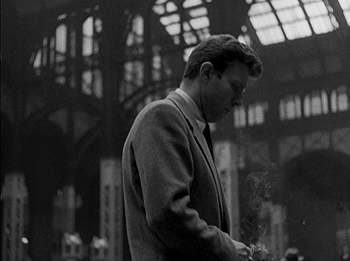 |
Shot 232b | Shot 233 |
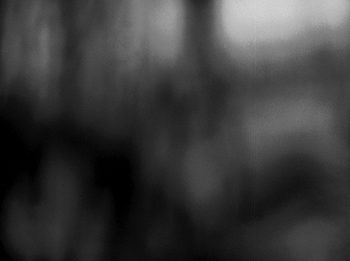 | 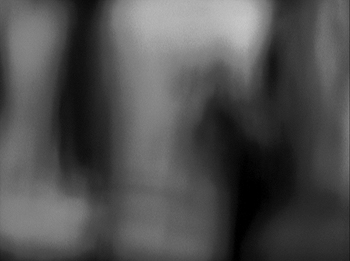 |
Shot 233a | Shot 234 |
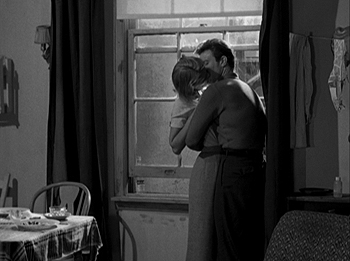 | 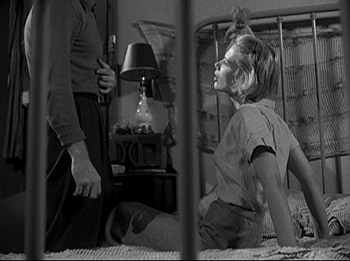 |
Shot 235 | Shot 236 |
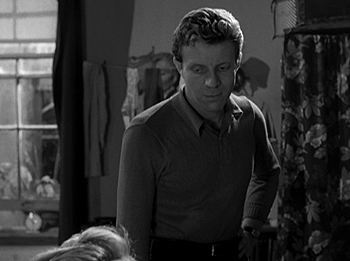 | 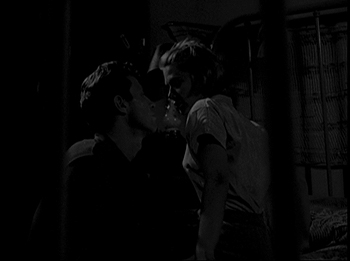 |
It's interesting that Kubrick has Davey make his proposal (or whatever it was) off screen.
Kubrick didn't feel bound to insert a love story or sex into every film, and the sex that is there is often problematic. Some people seem to feel that Kubrick preferred his cinema women in bondage and helpless. For instance, in Fear and Desire the female character was bound to a tree, negotiated for temporary freedom with a seeming promise of sex, then escaped a potential rape only to be killed. In this film, again, we will have Gloria bound and negotiating for her life with sex. In Lolita, Humbert does literally kidnap Lolita and holds her as his sexual hostage (it's not the love story of the century), but there is not even a kiss between them, and even Charlotte and Humbert never kiss, instead hugging in bed. In A Clockwork Orange we have a woman bound and raped but also have some consensual, unromantic sex between adults. There is no sex at all in 2001. The only kiss in The Shining occurs between Jack and a hallucination or phantom. There is no sex in Dr. Strangelove, only the promise of lots of it in the underground nuclear bunkers. Barry Lyndon provides some romantic affection, which is a rarity for Kubrick, and Barry abuses his wife's trust badly. There's no romance or sex in Full Metal Jacket except for some GIs going off with some prostitutes. In The Killing there are a few screen kisses and a suggestion of sex having occurred. And then there's Eye's Wide Shut, and I won't get into that here.
Kubrick clearly was not and never was interested in bringing in inessential romance for sake of attracting a segment of audience that wants romance in every film, or to broaden his audience.
I could always be wrong, but based on how Kubrick deals with authoritarian power structures in his films, such as the army in Paths of Glory, how they are pointlessly sacrificed, the abuses to which these women are subjected instead highlights society's injustice regarding the female sex and sexual abuse being a perverse display of power.
Iris' husband may be kind, and she may seem to devote herself to her father's care, but due her sex she has been expected to abandon her career and marry (trade sex for stability) in order to provide for her family. Gloria feels for the kind husband and the fact that Iris didn't love him, but if one thinks about it critically, he's the one who demanded Iris give up her art for a home, which is not kind at all.
Concerning Gloria, the film deals with rape during a time when it was accepted that "bad girls" got what they deserved. Gloria would have been considered a bad girl, dancing for money in a place she describes as "depraved". The audience sees her kiss her boss. In his office, she looks willing. But she is in his office. A consensual kiss is a consensual kiss, except, y'know, there are authority problems in an employer/employee relationship. After this, a troubled Gloria is shown returning home and when Vincent comes to her apartment it is made clear she was raped. There are those who would have felt (would still feel) that Gloria's kissing her dance hall boss was as good as giving him the green light to do whatever he wanted. What we don't see is that she likely said, "No more," and her boss went ahead and raped her. As far as he is concerned, he owns her, no matter the fact he begs her to let him be her "slave".
Gloria and Davey kiss but she's reluctant to attach the word "love" to this new relationship. Then, Gloria having scorned the idea of love, Kubrick has Gloria sit down on the bed before Davey in a rather expectant position. What's he going to do? She was just raped the night beforehand. Will he rape her as well? Does he own her as well? That seems to be what Kubrick is having Gloria ask physically, and Kubrick responds with Davey standing there in shot 235 saying nothing, just looking down at her staring up at him. Then, rather than sitting on the bed beside her, he kneels next to her. "Look, Gloria," he says and the screen goes dark. Most would script a love scene (as if a woman who's been raped is going to be inclined to have sex the next day). Instead, it seems that Davey proposes to Gloria, which is, yeah, problematic, committing to a long-term relationship after a day's acquaintance, but at least it's consensual.
August 2014 transferred to html. Approx 9465 words or 19 single-spaced pages. A 72 minute read at 130 wpm.
Go to Part 3
Go to Table of Contents of the analysis (with supplemental posts)
Link to the main TOC page for all the analyses